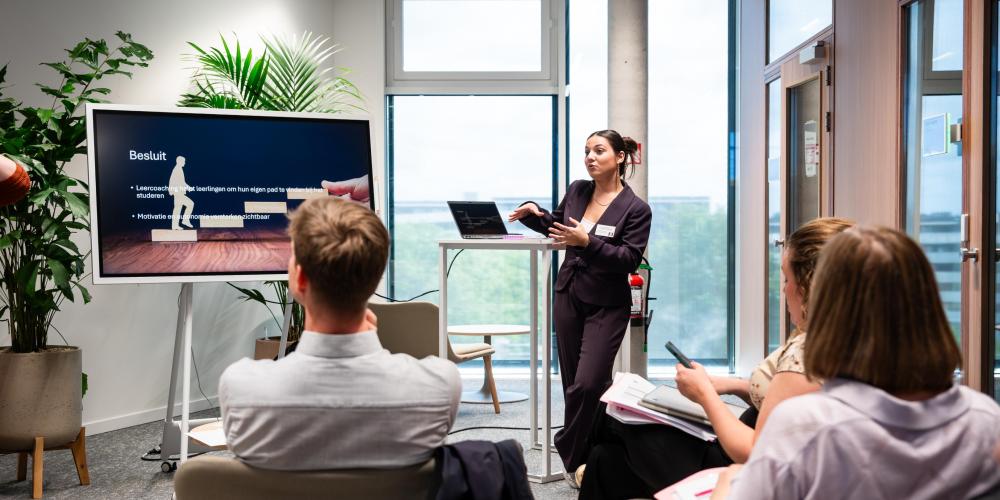
From 24 to 28 November, the VUB is hosting its annual leadership week – now for the fifth year running. With this initiative, the university brings Engaged Leading, the VUB’s own leadership vision, to its staff in an active and forward-looking way. A cultural shift in a large organisation – let alone a whole sector – doesn’t happen overnight. But you can clearly state what you stand for and support your people with inspiration and training.
View the programme (internal access only via WeAreVUB Staff)
A recent Pano episode painfully revisited a case of toxic leadership. The leadership shown in the report does not reflect the daily reality at the VUB. Still, such extremes remind us that the work isn’t finished. Only when everyone pulls together can the ship move safely towards the safe harbour we aim to be. It underlines the importance of proactive initiatives like Engaged Leading.

Robin Reul, Policy Officer Leadership Development
“For a large organisation, it’s essential to spell out early on what behaviour you expect from people in leadership positions”
Building connection, offering direction, and stimulating growth
As VUB, we want to keep pushing forward even in challenging times, under growing financial pressure, and with the same ambition for the university and its people. That means reflecting on how leaders, researchers and staff build connection, offer direction and encourage growth. That is exactly what Engaged Leading Week provides.
Throughout the week, staff can take part in inspiration sessions, lectures and training sessions. The programme is open not only to formal leaders, but to all employees. One of the core principles is that every VUB member can be an engaged leader. For the collective good, with a genuine heart for people.
This fifth edition centres on a constructive feedback culture. It focuses on how we give, receive and use feedback as a driver for cooperation and development. The keynote will be delivered by Shana Mertens, Assistant Professor of Organisational Psychology at the Open Universiteit of the Netherlands. Her research looks at normalising informal workplace feedback. Why does feedback often feel vague or awkward? What does organisational psychology tell us about what works – and what doesn’t? How do we create conditions for real, constructive conversations? As a researcher, podcast maker and author, she offers an accessible and refreshing take on feedback.
A call to responsibility
“It’s positive that leadership is getting more attention today,” says Robin Reul, who has been driving Engaged Leading for years through VUB LRN. “For a large organisation, it’s essential to clarify in advance what behaviour you expect from people in leadership roles.” This also helps prevent transgressive behaviour.
The Pano report may not have been representative of the VUB, but it made clear that toxic leadership can occur, and more importantly, what impact it can have on people. It also showed that existing procedures fell short: they no longer meet today’s expectations and do not offer timely solutions. People felt unheard. That must change.
“Let’s build a culture where human-centred leadership and wellbeing are simply the norm”

Elke Jorens, Director M&O
Our strongest opportunities for real change lie in the preventive, proactive appeal to individual responsibility. By clearly communicating expectations and equipping our leaders, we can enable collective change from the individual level up. Through training and campaigns focused on personal growth, every staff member can gradually contribute to a renewed organisational culture. That is the heart of Engaged Leading: how every VUB member can strengthen the whole.
The importance of leadership in wellbeing
The human impact of failing leadership can be significant. That is precisely why we must ensure leadership succeeds. Human, strong and collectively minded leadership makes a daily difference. Investing in human-centred leadership is one of the most direct ways to strengthen an organisation and support everyone’s wellbeing.
Elke Jorens, Director of People & Organisation, emphasises the leverage effect of leadership in wellbeing.
“My message is simple: as a leader, take your key role in wellbeing seriously and stay attentive to your team, guided by the VUB’s values. Think consciously about why you are a leader and what you can do for the wellbeing of your employees. By creating a safe and warm working environment, we can deliver on our shared mission of education, research and engagement. Let’s work together to build a culture where human-centred leadership and wellbeing go hand in hand.”
Read the full interview with Elke Jorens on wellbeing policy and leadership at the VUB: VUB builds a stronger wellbeing policy for its staff | Vrije Universiteit Brussel
What is Engaged Leading?
The gallery of modern leadership is filled with striking terms: personal, human, participatory, shared, supportive… leadership. Engaged Leading grew within our Urban Engaged University, the VUB, as a concrete response to proactively strengthen and support leadership practice.
The VUB defines its desired leadership as a collective activity, driven by motivation and intent, aimed at building stronger connection between people and groups.
Engaged Leading encourages staff to want and dare to take up and share leadership, to name issues, act decisively and take ownership. It is a personal form of leadership that works collaboratively towards shared goals.
Engaged leaders are inspiring and motivating. They take responsibility for their decisions in line with the bigger picture. They tackle challenges and lead by example. They act consistently, with integrity and authenticity. They enter dialogue with curiosity for different perspectives. They pay attention to the needs of others, offer safety and show openness.
Want to know more?
For those working internally on leadership or wanting to dive deeper into the programme, you will find all practical information here. These pages are only accessible to VUB staff after login.